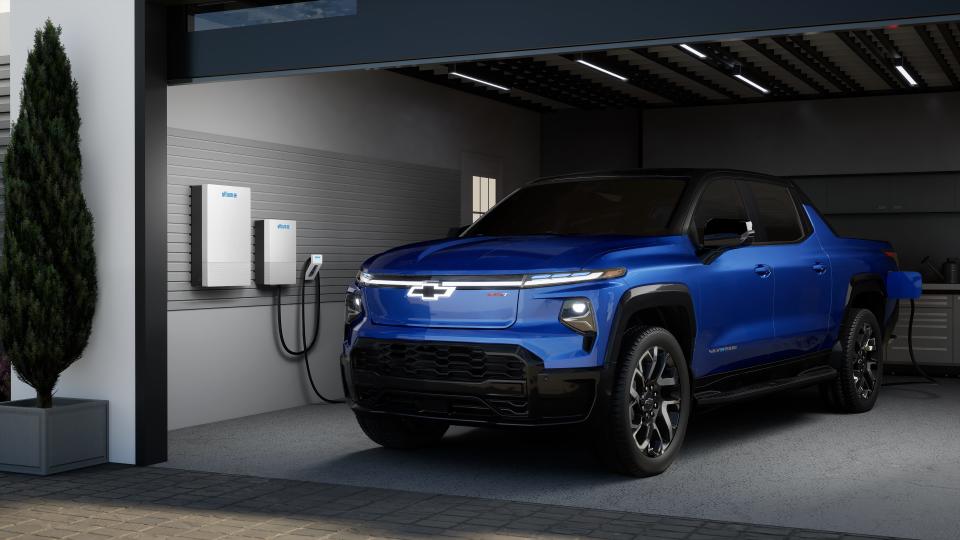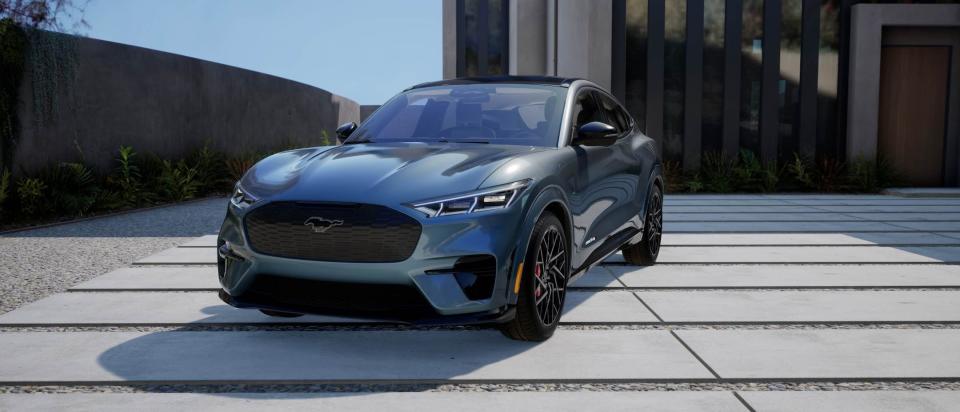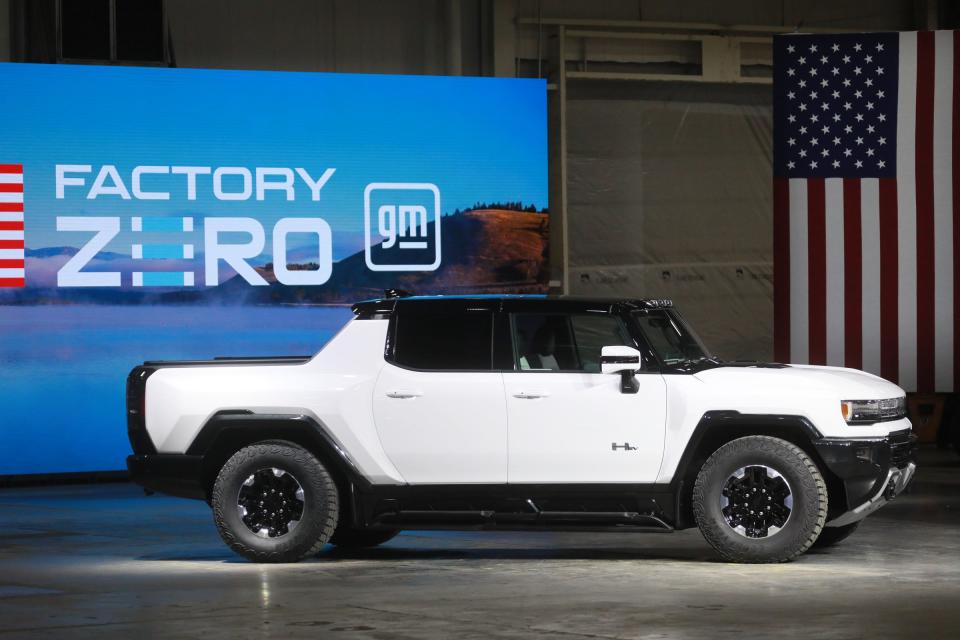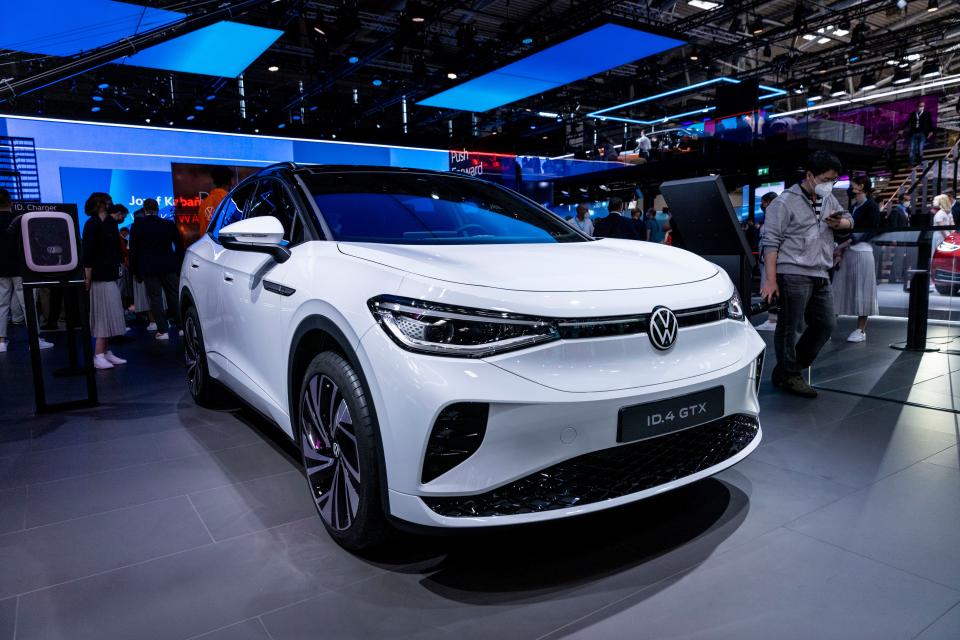Car buyers considering an EV have more options thanks to a weird loophole in the law
Car buyers considering an electric vehicle now have more options to ease their pocketbook thanks to a loophole in the Inflation Reduction Act that allows vehicles made outside of North America to qualify for the tax credits anyhow.
The government laid out the IRA's rules last year. It specified: For a buyer to get some or all of a $7,500 federal tax credit, the EV had to be assembled in North America and the battery and a percentage of other components could not be sourced by "a foreign entity of concern" — which many interpret to be China. Beginning next year and in following years, an eligible clean vehicle can't contain any critical minerals that were sourced by a foreign entity of concern.
There are also price caps and income caps to meet: A car has to be priced less than $55,000, and pickups or SUVs must be less than $80,000. The income for an individual buyer has to be less than $150,000 a year and for a household, less than $300,000 annually.

But because of a loophole Congress put in the law in August, which the U.S. Treasury defined in December, consumers can now capture that full incentive by leasing the car rather than buying it — regardless of where it is made, where the materials are sourced or any of the other rules.
“The tax credit for leased EVs is more Washington theater where politicians boast about their support for U.S. industry but don’t mention the loopholes lobbyists bought that gut the pretend support," said Erik Gordon, of the University of Michigan's Ross School of Business. "Any car that is leased is classified as a commercial vehicle, even if it is a two-seat convertible. It would make more sense to classify tennis rackets as medical equipment because you get exercise when you use them.”
Trading partners revolted
The reason behind Washington lawmakers' wishy-washiness lies in the nation's relations to its trading partners, who objected after President Joe Biden's administration laid out the rules intended to support domestic EV development, said Chad Bown, senior fellow at the Peterson Institute for International Economics.
"The tax credits were really designed to encourage the automakers to plow resources into developing low-end models that non-rich people would buy, to blow up the numbers of how many EVs would enter the market," Bown said.
He said data from the National Energy Association showed that, in 2021, EVs accounted for less than 6% of the U.S. car market, whereas in China, EVs made up 16% and in Europe, 18%.
"So the U.S. was really behind," Bown said. "All of a sudden, under the IRA, vehicles that were imported that used to be eligible for tax credits under the original 2009 law ... were cut off. That’s what made trading partners super upset."
France's President Emmanuel Macron came to Washington in early December and told lawmakers from both political parties that the IRA was "super aggressive" toward European companies, according to Reuters.
The leasing frenzy is unleashed
Biden's administration realized the political challenge with allies, Bown said. So, on Dec. 29, the U.S. Treasury Department decided to interpret a commercial vehicle as being one that a business might lease and "that would give it access to a separate tract of tax credit" in the IRA, Bown said.
"So if the car companies set up a commercial leasing division and they buy their own vehicles in it, then they get the tax credit and they can pass it onto the consumer and they don’t have to be trucks or vans," Bown said. "No other criteria apply. You can be super rich and qualify for this or the vehicle can be priced any price. There is also no restriction that it has be made in North America or that the batteries have to be sourced from outside of China."

The news sent some automakers into an aggressive leasing frenzy. Hyundai and Kia, for example, said they plan to increase leases from 5% of sales to 30% as a result of the IRA changes, according to a February article in the Los Angeles Times.
In fact, on June 27, Cox Automotive published a forecast saying this year U.S. EV sales across the industry will surpass 1 million units for the first time. EV share is approaching 7% of the total U.S. auto market, Cox said.
The EV lease rate soars
Since December through June, the lease rate for imported EVs has taken off, according to data from auto research firm Edmunds.com.
Edmunds reports about 37% of EVs bought in April were leased, up from 17% in April 2022. In May, about 44% were leased, up from 15% in the year-ago period. For June, 44% were leased compared with 13% in the year-ago period. Here are some of the EVs that are seeing big gains in leasing since the loophole took effect, Edmunds data shows:
Kia EV6: In June, 72% were leased, up from 2% in June 2022.
BMW i4: In June 66% were leased, up from 11% in the year-ago period.
BMW iX: In June, 71% were leased, up from 16% in the year-ago period.
Polestar 2: In June, 82% were leased, up from 34% in the year-ago period.
Hyundai Kona Electric: In June, 68% were leased, up from 18% in the year-ago period.
Hyundai Ioniq 5: In June, 43% were leased, up from 1% in the year-ago period.
Audi e-tron GT: In June, 85% were leased, up from 31% in the year-ago period.
Of this sampling, the lease penetration rate on these vehicles have consistently risen each month since January, the first month after the leasing loophole took effect.
Ivan Drury, director of Insights at Edmunds, surmises that the bulk of the increase in lease penetration of EVs listed above is being driven by automakers taking advantage of the loophole credit. But Audi spokesman Whaewon Choi-Wiles said in an email to the Free Press, "Our sales strategy remains unchanged at this time" and he added that the "e-tron GT sales were primarily driven by an increase in supply."
The leasing loophole does benefit consumers beyond saving them money, Drury said.
"First-time EV owners are testing the waters and a lease makes more sense," Drury said. "Even seasoned EV owners might know that these vehicles often have low residuals; therefore, I'd rather have someone else handle the disposal of it if possible."

The loophole does not "100% remove the competitive advantage" given to those Detroit automakers that have made big investments in making their EVs as American as possible, Drury said. But it does "carve out an angle" for the foreign automakers that wasn't there before.
"Immediate impacts have yet to be fully recognized as many upcoming EV launches from Detroit already have customers lined up with reservations," Drury said. "But once the market for EVs becomes saturated and the early adopters and reservations systems are put to rest, we'll be down to the bulk of the business, regular customers who want test drives, discounts, no wait times, et cetera."
That will be when "every dollar counts, every incentive gets eyeballs," he said.
"Pricing for EVs is already difficult when it comes to recouping costs versus keeping a competitive advantage," Drury said. "Without the ability to clearly know the price of the competition, automakers that fall under all the qualifications for getting the rebate into the hands of their customers might need to price their vehicles more aggressively than previously planned."
How the Detroit automakers are handling it
At Ford Motor Co., tax credits are included in the mix of factors it considers as it works with Ford Credit to plan marketing programs and other incentives, said Marty Gunsberg, Ford spokesman for Model e communications.
"Leasing is an option for Mach-E customers who prefer it," Gunsberg said in an email. The Mustang Mach-E does not qualify for the full tax credit in a purchase because its battery does not meet the IRA's sourcing requirements. But it can pass along the full tax credit through a lease.
"Offers may vary by location and customers should contact their dealer to find out what is available in their area," Gunsberg said. "Tax credits are included in the mix of factors we consider as we work with Ford Credit to plan marketing programs and other incentives."

At General Motors, the focus remains on the tax incentive to buy an EV rather than offering it through a lease, spokesman Matt Ybarra told the Free Press. That's because leasing is a smaller segment of the market. For all of 2022, leases made up 15% of GM’s total 2.27 million vehicles sold in the U.S., he said.
"GM is very well positioned to leverage the consumer purchase incentive for EVs thanks to our supply chain work; all of our EVs under the MSRP caps qualify in 2023 for the full $7,500 credit," Ybarra said. "Overall, we think there’s more value in the $7,500 consumer incentive than there is in the commercial EV leasing incentive."
Ybarra said customer demand for the GMC Hummer EV pickup remains high without the vehicle qualifying for the consumer tax credit, and lease penetration for that vehicle is "in the low single digits." The Hummer is priced at over $100,000 so it does not qualify for the federal tax credit. So far, in the first half of the year, GM has delivered only 49 Hummers to customers.

At Stellantis, the company that owns Chrysler, Dodge, Jeep and Ram brands, spokesman Eric Mayne said, "We will work with our customers to accommodate their choices, whatever they are."
On Monday, Stellantis released earnings that show sales gains for its plug-in hybrid models. It said Jeep Wrangler 4xe is the top-selling plug-in hybrid in the country, the Grand Cherokee 4xe is No. 2 and the Chrysler Pacifica Hybrid is No. 4. When asked whether the sales gains came from increased leasing, Mayne said the company does not break out that information and referred back to his comment above.
Foreign automakers expect lease rates to rise
At Nissan North America, spokeswoman Jeannie Whited said the Leaf EV remains "an important component of Nissan’s electrification strategy" so the company is offering the vehicle at a lease rate competitive within the marketplace. Currently, the 2023 Leaf S lease is available at $309 per month for 36 months with $1,999 due at signing. The 2023 Leaf SV Plus lease is available at $399 per month for 36 months with $1,999 due at signing. The prices do factor in the $7,500 tax credit, Whited said.
At Toyota North America, spokesman Ed Hellwig said: "Under the provisions of the Inflation Reduction Act of 2022, as a leasing company, Toyota Lease Trust can claim tax credits for leasing battery electric vehicles (BEVs) and plug-in hybrid electric vehicles (PHEVs) to consumers. We are partnering with Toyota, Lexus and our private label client to pass along the benefit of those tax credits to customers. This makes leasing more affordable and gets more clean vehicles on the road."
Hellwig said the tax credit to the leasing customers is in the form of a "Rent Charge Factor (RCF) reduction on leases for the applicable vehicles." Toyota does not break out its lease penetration rate from its total sales, Hellwig said. But the automaker's lease penetration has been lower than normal "for some time," he said, adding, "We expect lease penetration for EVs to rise as a result of the incentive."

Hyundai-Kia did not respond to a request for a comment for this article.
Through Subaru Motors Finance, the automaker passes along the tax credit on leased EVs including the 2023 Solterra SUV, said Subaru spokeswoman Diana Anton.
"From a Volkswagen perspective, we aren’t looking to increase leasing, because the Chattanooga-assembled ID.4 gets the full $7,500 tax credit, whether leased or purchased," said Mark Gillies, spokesman for Volkswagen Group of America.
Honda North America is not selling EVs in the United States at the moment, said Lynn Seely, spokeswoman, but it is "looking forward to reentering the EV market early next year."
More: GM CEO Mary Barra opens up on slow EV rollout, return to office
More: Record number of car buyers paying $1,000+ per month amid low vehicle inventory
Contact Jamie L. LaReau: jlareau@freepress.com. Follow her on Twitter @jlareauan. Read more on General Motors and sign up for our autos newsletter. Become a subscriber.
This article originally appeared on Detroit Free Press: An unusual loophole helps car buyers get into a new EV for less money